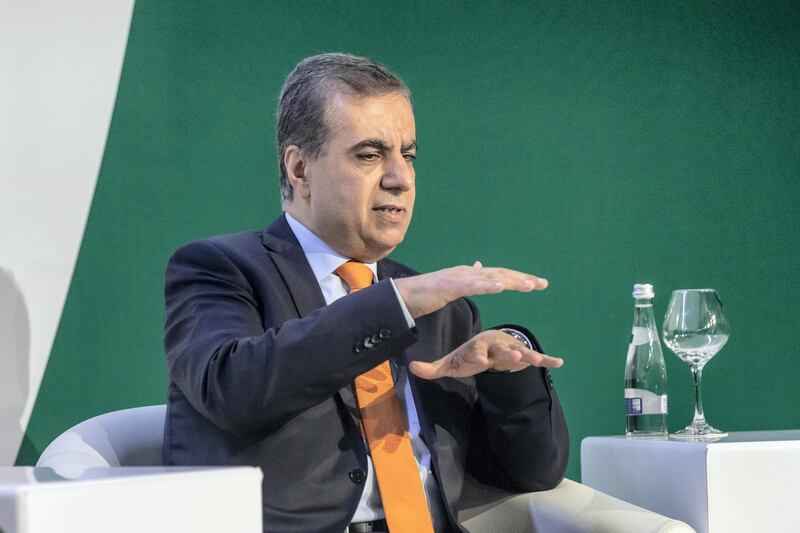Air Arabia Abu Dhabi plans to expand its fleet to 20 Airbus aircraft over the next five years amid optimism about future growth once air travel restrictions ease, its group chief executive said.
The airline, which currently operates three Airbus A320s in the UAE capital, also expects annual passenger traffic to initially grow 20 to 25 per cent over the same period, Adel Ali told The National on Tuesday.
"With the caveat that based on what surprises we get from Covid-19 and unexpected things happening, we should really be able to grow the business ... with 20 planes operating out of Abu Dhabi in the next five years," Mr Ali said.
The airline, a joint venture between Air Arabia and Etihad Airways, launched in July 2020 during the Covid-19 pandemic with a maiden flight to the Egyptian port city of Alexandria from Abu Dhabi International Airport. The UAE capital's first budget carrier aims to draw tourists to the Gulf city, supply passengers from secondary cities into Etihad's long-haul operations and offer affordable travel options to UAE residents. The joint venture is part of Abu Dhabi's push to diversify its economy, boost tourism and enhance its air connectivity.
Air Arabia Abu Dhabi, which will complete its first year of operations on July 14, plans to "accelerate growth" once the emirate loosens its Covid-19 travel restrictions, Mr Ali said.
"We’re very satisfied, under the circumstances of Covid and lockdowns everywhere, with the result that the company has produced for us in Abu Dhabi, which makes us optimistic about future growth once there’s normality and Abu Dhabi opens," he said.
The emirate is set to bring into force new Covid-19 quarantine-free travel rules starting next month. Abu Dhabi's Department of Culture and Tourism said it plans to lift quarantine restrictions for inbound travellers from July 1, apart from visitors from India, which is battling a devastating second wave of the pandemic.
Air Arabia Abu Dhabi is in "continued dialogue" with the authorities for updates on travel rules and once it receives confirmed information, it plans to "roll out more activities", Mr Ali said.
The airline currently operates to 14 destinations, including a new service to Trabzon in Turkey with direct flights from Abu Dhabi starting on July 13.
The CIS, Arab countries, eastern Europe and the Indian subcontinent (once travel re-opens) are among the most attractive markets for the airline, he said.
During its first year of operations in the midst of the pandemic, demand was “good”, Mr Ali said. The airline recorded 13 hours of utilisation per aircraft, with outbound load factors—a measure of how many seats an airline fills—reaching more than 70 per cent though inbound load factors were “much lighter”, Mr Ali said.
“Once things open up, we’re optimistic about the hub,” he added.
Abu Dhabi's investment in its tourism sector to attract foreign visitors will also open new opportunities for the young airline and help drive annual growth over the next five years, he added.
"Abu Dhabi itself has invested large amounts in infrastructure, developing hotels, tourism attractions, visitor parks, entertainment, the city has a lot to offer," Mr Ali said. "This is an opportunity. There’s a lot of room to develop."
Air Arabia operates five hubs in Ras Al Khaimah, Sharjah, Abu Dhabi, Egypt and Morocco, which helped to spread the risk across different geographies when the Covid-19 pandemic shuttered borders around the world, he said.
Air Arabia recorded a profit of Dh34 million in the first quarter of 2021, but Mr Ali said it was too early to say if the second quarter will also be profitable and that the industry is focused on narrowing losses at this stage.
“We’re not pessimistic about Q2 but we’re cautious,” he said, noting that the UAE’s extended ban on travel from India, one of its main markets, “will have an impact”.
Reflecting on the outlook for its hubs during the second half of the year, Mr Ali said Morocco will reopen its borders for travel on June 15, so operations into Europe “look extremely good” and the hub is likely to benefit from a “good summer” travel season.
The hubs in the UAE should be “at least stable and from here on should see gradual growth” due to the country's rapid vaccination rollout, while the Egypt hub has been “reasonably stable”, he said.
Mr Ali said he is optimistic that low-cost carriers will lead the recovery in air travel, as people will initially take short-haul trips and seek value for money.








